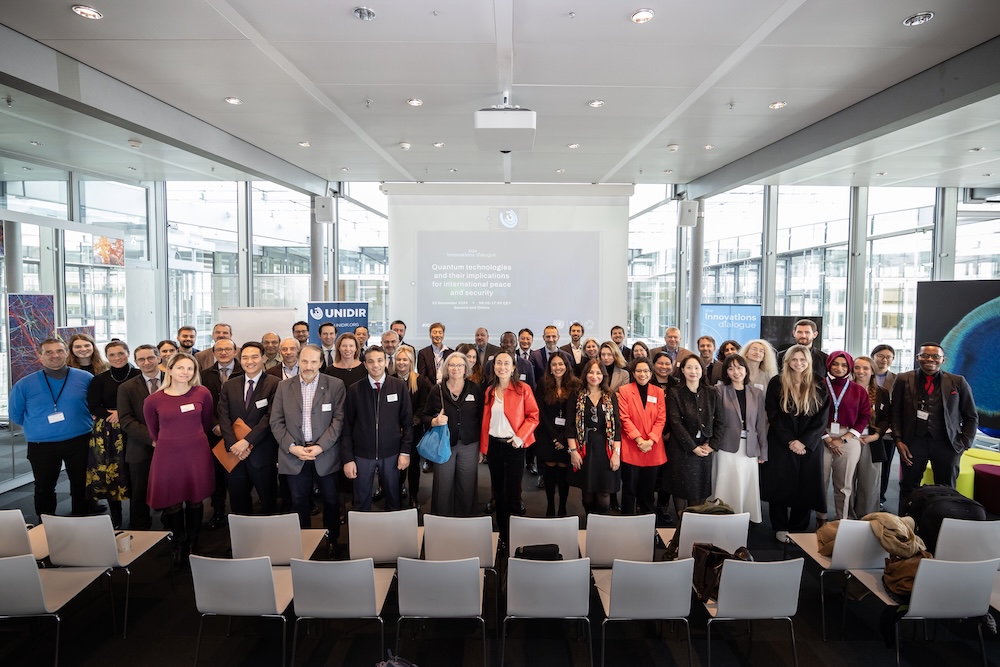The United Nations has declared 2025 as the International Year of Quantum Science and Technology. This global initiative underscores the pivotal role of quantum science in driving technological innovation, promoting sustainable development, and enhancing equitable access to education and economic opportunities. UNIDIR’s 2024 Innovations Dialogue provided a vital platform for discussion on quantum technology’s implications for peace, security and global governance frameworks.
Alongside recognizing the potential of quantum technologies, the UN has raised concerns regarding their security implications. In 2022, the UN Secretary-General addressed the General Assembly, cautioning against the risks posed by quantum computers, particularly their capacity to “undermine cybersecurity and increase the risk of malfunctions in complex systems.” He also emphasized the lack of a “global framework to address these risks.”
The impact of quantum advancements
Quantum technologies are rapidly progressing beyond the lab, with the potential to revolutionize numerous sectors and profoundly influence the future of the global economy, security frameworks, and scientific discovery. Governments worldwide are acknowledging quantum technology as a strategic priority, viewing its applications as essential to economic growth, technological leadership, and national security.
For example, quantum computers could solve complex problems beyond the reach of classical computing, impacting fields like supply chain optimization, material science, and drug discovery. Rapid advancements in quantum cryptography, communications and sensing can revolutionize these sectors and reshape global economies, defense infrastructures, and scientific research. Although several applications are still in the developmental phase, recent breakthroughs indicate substantial progress.
Historically confined to academia, quantum technology is now seeing significant investment from both the public and private sectors, accelerating its transition to real-world applications. Tech giants, startups, and government initiatives are pouring resources into quantum research and development, fueling competition and innovation. This trend highlights the urgency of establishing ethical, regulatory and security standards to guide the deployment of quantum technologies in ways that benefit society while minimizing potential risks.
As quantum technologies continue to develop, the global community is entering a pivotal era where these advancements could bring unparalleled opportunities as well as critical challenges.
UNIDIR’s role in quantum security
In this rapidly evolving landscape, UNIDIR’s Security and Technology Programme is instrumental in shaping global understanding and policy on quantum technologies. Through focused initiatives, the programme offers policymakers and stakeholders a clear perspective on the complexities and security challenges posed by quantum advancements. Key activities include:
- 2023 Multistakeholder Dialogue on Quantum Technologies – UNIDIR brought together experts from various fields to explore the policy, security and ethical considerations essential to responsible quantum development and their implications for international peace and security.
- A Compendium on Enabling Technologies and International Security – UNIDIR published an in-depth compendium that examines enabling technologies, including quantum, providing foundational insights for stakeholders navigating the intersection of emerging technology and global security.
- A Primer on Quantum Technology, Peace and Security – UNIDIR’s publication explores how quantum’s transformative potential could revolutionize sectors such as cybersecurity and defense, highlighting both opportunities for innovation and risks to international security.
- 2024 Innovations Dialogue on Quantum Technologies – On 22 November, in collaboration with the Geneva Science and Diplomacy Anticipator, UNIDIR hosted the 2024 Innovations Dialogue focused on quantum technology’s implications for international peace and security. This event offered a forum for experts and policymakers to collaboratively address challenges and identify frameworks to responsibly integrate quantum advancements.
As we approach the International Year of Quantum Science and Technology, UNIDIR remains committed to equipping stakeholders with the insights needed to navigate the transformative potential of quantum technology and shape a safer and more secure quantum future for all.
